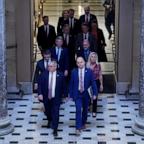More people file tax returns early, more e-file
More than 38 million Americans have already filed electronic tax returns.
— -- More than 38 million Americans filed electronic federal tax returns in the first two months of the year, a 5% increase from 2007, the IRS said Monday in the first statistics of this tax season.
Filers who prepared their own taxes and transmitted them from home computers accounted for more than 12.3 million of the electronic returns, up nearly 14% from last year, the data showed.
"E-filing continues to be the preferred way to file your tax return," said IRS Acting Commissioner Linda Stiff, stressing the agency's continuing effort to shift filing from paper to computer.
Taxpayers are sending more money to Washington — and getting more back — the initial filing data showed. The number of refunds processed so far was up 2%, to 39.4 million. The dollar value of those refunds topped $106 billion, a 4% increase. The average refund was $2,708, up from $2,655 last year at the same time.
The data compared filings through Feb. 22 with the comparable period last year. It showed the IRS had processed more than 42.8 million individual income tax returns, up 2.3% from 41.9 million returns during the same period in 2007.
At least temporarily, the increases in filing and processing volume appeared to ease concerns about potential tax season delays caused by Congress' December enactment of an increase in the income level under which taxpayers are exempt from the alternative minimum tax.
The IRS previously warned that as many as 13.5 million individuals might have to delay filing their tax returns until Feb. 11 in order to give the tax agency time to reprogram its computers to handle the changes.
In part, IRS spokesman Robert Marvin tentatively attributed the early increase in returns to "the successful implementation of the alternative minimum tax legislation," as well as filers seeking the economic stimulus payments recently approved by Washington.
National Taxpayer Advocate Nina Olson, in her December report to Congress, identified late-year federal tax law changes as the most serious problem facing both taxpayers and the IRS.




